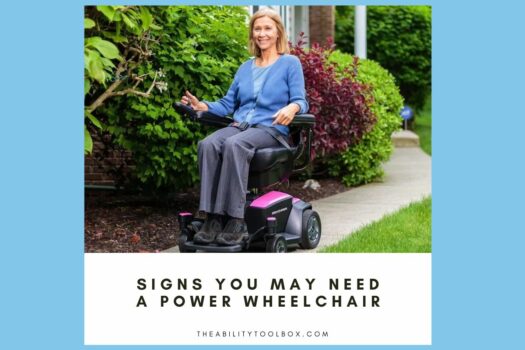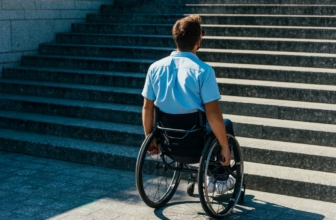Power wheelchairs are an essential mobility aid for millions of people with disabilities worldwide. Whether you're going grocery shopping, spending time with family, pursuing higher education (at any age), working at your dream job, or traveling the world, a power wheelchair can empower you — literally — to achieve your goals. In this guide, we'll discuss the signs you may need a power wheelchair and not just a manual, self-propelled one.
What is a power wheelchair?
A power wheelchair is a motorized mobility device for people who have difficulty walking due to a medical condition. There are many different types of power wheelchairs and mobility scooters with varied features depending on your needs and level of physical ability.
Power wheelchairs are sometimes called power chairs or electric wheelchairs — but please don't call them electric chairs!
Power wheelchairs run on batteries, not gas, so they can be used safely indoors. Most power wheelchairs use specialized sealed lead acid batteries that are similar in size to lawnmower batteries, but designed for continuous use rather than just for starting an engine. Some portable power wheelchairs and mobility scooters use a much smaller, lighter lithium battery. A power wheelchair's batteries need to be recharged while you sleep, every night or every other night depending on how much you use it during the day.
How to Decide Whether You Need a Power Wheelchair
If you're struggling with your mobility, the idea of using a scooter or power wheelchair may have crossed your mind. If you're aging or have a progressive disease, you might have tried using other mobility aids such as a cane, walker, or self-propelled wheelchair. You might use one of the motorized carts when you go grocery shopping and wonder if you should have one of your own.
Here are some signs you may need a power wheelchair:
1. You may need an electric wheelchair if pushing yourself becomes exhausting and/or painful after a few minutes.
If you have weakness, chronic pain, or limited mobility in your arms and shoulders, you may not be able to push a manual wheelchair very well. If pushing your wheelchair regularly causes pain or exhaustion, then a power wheelchair may be right for you.
2. You may need a power wheelchair if you don’t leave the house often because it’s too hard to go places.
A wheelchair is supposed to replace your legs and allow you to do the same things you could do if you were able to walk. With the right wheelchair, you should be able to go to medical appointments, shop, and accomplish all the other important tasks of life like anyone else. If you find that you don’t leave the house often or can't go out by yourself because you can’t push your wheelchair for long distances, a power wheelchair might be the solution.
3. You may benefit from having a motorized wheelchair if you can’t keep up with friends and family and they have to push you most of the time.
It’s hard to be dependent on others, even when they don’t mind helping. You have the right to independent mobility just like every other person in this world, and you should be able to spend time with your loved ones on an equal level. If you want to be able to move around on your own and not have to ask for help all the time, a power wheelchair will give you that freedom.
4. You should consider using a power chair if your manual wheelchair gets stuck on thresholds and other obstacles and you have no way of getting over them by yourself.
The front wheels on manual wheelchairs are tiny because they are designed for the user (or the person pushing them) to tip back (pop a wheelie) to get over obstacles. If you’re not able to pop a wheelie and find yourself getting stuck, flipping your chair over forwards, and generally struggling to get around, a power wheelchair could help you.
5. You may need an electric wheelchair if a mobility scooter doesn't work well for you.
Some people with mobility challenges can use a 3-wheeled or 4-wheeled scooter to get around. Mobility scooters are great for those who are partially ambulatory and just need help with long distances. However, they don't do well in tight spaces as they are usually longer than power wheelchairs and have a wide turning radius. Some people with arthritis or hand weakness may find steering them to be difficult.
If you frequently need to use a power mobility aid indoors, especially in your home, or you have limited arm and hand usage, you need a power wheelchair with a joystick control rather than a scooter.
6. You may need an electric wheelchair with custom seating if you have had pressure sores and can't change positions.
Pressure sores (decubitus ulcers) happen when you sit in the same position for too long and your skin breaks down. Pressure sores can land you in bed for weeks or months, require surgery, and even become life-threatening if they get infected. To prevent pressure sores, your doctor and/or physical therapist should have advised you to change positions frequently and use a cushion designed to reduce your chances of developing this injury.
If you’re a manual wheelchair user, you should be spending time out of your chair and/or tipping yourself back for a few minutes every hour or so to relieve pressure. If you’re not able to do this and you’ve developed a pressure sore (or you’re at risk of one) you may need a power wheelchair with positioning functions such as tilt and recline.
7. Your life can be transformed by a power wheelchair if you need more mobility to access your environment at home or work.
Power wheelchairs do more than just enable you to get around without pushing yourself. They can also have functions such as standing and seat elevation that will empower you to do everyday tasks such as transfers in the bedroom and bathroom, cooking, reaching high shelves and cabinets, and much more. If you can’t do these things, a complex rehabilitation technology power wheelchair could give you newfound independence.
Questions You Might Have If You Need an Electric Wheelchair
If you’ve decided that you could benefit from a power wheelchair but have some reservations, it’s OK to take your time and think about it. Power wheelchairs are life-changing in positive ways, but they can bring practical and psychological challenges that you may want to work through before you get one. Here are some answers to common questions you may have.
I feel ashamed or embarrassed to use a wheelchair. Is that normal?
If you're struggling to accept that you have a disability, using a wheelchair can bring up a lot of emotions. People with disabilities experience discrimination due to ableism, and we can absorb society's negative views of us. This is known as internalized ableism, and it can be as disabling as any physical or mental symptoms we experience. Non-disabled people tend to see wheelchairs as being limiting, as signs of things a person can't do, but
I can walk a little. If I get an electric wheelchair, do I have to use it all the time?
No, you don't have to be a full-time wheelchair user to benefit from having a power chair. People who need wheelchairs part-time are known as ambulatory wheelchair users. Many wheelchair users can walk a little bit at home, in the bathroom, etc. However, if you need insurance to pay for an electric wheelchair, you must say that you need to use it in your home for at least one activity of daily living.
Does my child need a power wheelchair?
If you're asking, and one or more of the signs above apply to your child, the answer is probably yes.
From the playground to the prom, children with disabilities need and deserve the chance to socialize and keep up with their peers as they grow. Kids with mobility challenges want to do things on their own and form friendships that are not based on other children being asked by adults to help them or be nice to them.
I started using a power wheelchair at age 15. I needed one long before that. For years, my mother didn’t want me to get one, believing I would become “more disabled” if I used one. She believed I would lose the physical abilities I had. However, the truth was that I could barely push a manual wheelchair. I couldn't go to the mall or movies with my friends without them having to push my wheelchair.
Yes, I did lose some arm strength — but that would have happened anyway because of how cerebral palsy affects people as we age. There were far more things I couldn’t do as a child that I can do now because I have a power wheelchair.
How do I handle transportation as a power wheelchair user?
Many people hesitate to get a power wheelchair because they worry about how they will get around in one. Some power wheelchairs, especially those that include complex rehabilitation technology features such as tilt and recline, are heavy and can’t easily be loaded into a regular vehicle. Mobility vans with a ramp or lift can be expensive and out of reach for many people.
Transportation is indeed the biggest challenge you will face as a power wheelchair user. The world is not set up for people who can’t just hop in and out of a car. However, there are some potential solutions.
Use a portable electric wheelchair.
Portable power wheelchairs are an emerging and promising technology for people who need to use a car without a ramp or lift. They feature lightweight lithium batteries and fold easily to fit in the trunk or backseat of a car. They’re also great for air travel as they are less likely to be broken in transit.
Take public transportation.
In the United States, thanks to the Americans with Disabilities Act, the vast majority of buses are now wheelchair accessible. Subway and train accessibility can vary depending on where you live. If you have accessible public transportation in your area, it’s worth getting a power wheelchair as you'll still be able to get around without needing a van.
Get an accessible van.
If you have a lifelong and/or progressive disability, having an accessible van can be life-changing. Unfortunately, they are extremely expensive. It’s not easy to get one, but options such as buying used, fundraising, and going through your state's Department of Vocational Rehabilitation or the Veterans Administration can help get you mobile in a power wheelchair.
How do I respond to people who judge me for getting a power wheelchair?
Power wheelchairs sometimes carry an unfair stigma. Maybe you’ve heard people say things like:
“You can use your arms, why can’t you push yourself?”
“You’re too young to need a power wheelchair.”
“Using a wheelchair is giving up on yourself.”
“If you don't keep using a manual wheelchair, you'll lose mobility.”
All these comments and others like them are rooted in ableism, and none of them are true. Don’t let other people's negativity keep you from getting the mobility device you need to have the great life you deserve. Here are some ways you can answer questions like those above.
“My medical condition causes pain/fatigue and pushing a wheelchair would be just as hard as walking.”
“I feel too young to be disabled, but unfortunately, my disease has other ideas. It can affect people of any age.”
“I'm not giving up on myself, I'm using a power wheelchair so I can be more active instead of being stuck at home all the time.”
“My physical therapist recommended that I do arm exercises instead of pushing a wheelchair so I can stay strong but be safer and more independent.”
“My doctor says I need a power wheelchair and I'm following their medical advice.”
“I believe I need a power wheelchair. Please respect my medical decisions just as I respect yours.”
What to Do Next If You Need a Power Wheelchair
If you’ve read this article and believe you may need a power wheelchair, here are some next steps:
1. Make an appointment to talk to your doctor and/or physical therapist.
If you're experiencing limited mobility, talk to your doctor and other healthcare providers. They can assist you in determining which mobility aid is right for you and write a prescription for insurance coverage.
2. Learn more about mobility aids before your appointment.
We've created several guides to power wheelchairs — check them out!
How did you know you needed an electric wheelchair?
Share your experiences with our community in the comments below.
Founder and Editor-in-Chief of The Ability Toolbox. I received my BA in English from Stanford University and MA in Clinical Psychology from Antioch University Los Angeles, and have worked in entertainment and health media for over 20 years. I also blog about traveling with a disability. As a wheelchair user with cerebral palsy, I am deeply committed to amplifying the voices of the disability community through writing and advocacy.
Dr. Wilson graduated from Rosalind Franklin University of Medicine and Science and completed her residency in Internal Medicine at Advocate Good Shepherd Hospital in Barrington, IL. Dr. Wilson specializes in providing culturally competent and trauma-informed care to patients with physical disabilities. In addition to her private practice, she works as a science communicator, teaching health literacy to middle school and high school students in her local school district.









Start the discussion at community.theabilitytoolbox.com